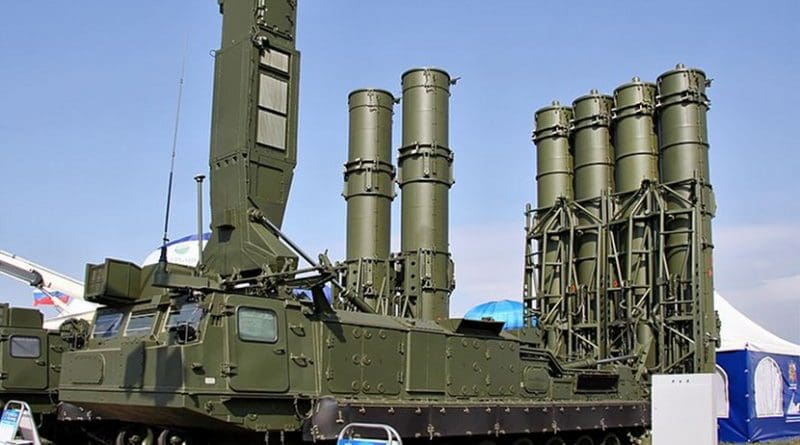Limiting Israel: Russia Deploys The S-300 To Syria – OpEd
Relations between Russia and Israel have been those of an estranged couple punctuated by occasional breakouts of tense understanding. As with other such couples, a public row does not necessarily reflect the more placid, if stern discussion that might happen behind closed doors.
On the public side of things, Russia’s decision to deploy the S-300 anti-aircraft missile system to Syria has made Israeli officials apoplectic. That said, Israel’s security establishment were privy to prospects of a possible Russian deployment of the modern, more discriminating air-defence system. The former head of the Israeli Defence Force’s Strategic Division, Brigadier General Assaf Orion at the Institution for National Security Studies, was reflective. “However one may keep in mind that for the last twenty years Israel was preparing for this to appear in theatre.”
In April, Amos Yadlin, the country’s retired Military Intelligence chief stuck his head out to issue a warning: should Russia supply Syria with S-300 anti-aircraft missiles, Israel’s air force would retaliate. Israel Defence Minister Avigdor Lieberman also upped the ante, suggesting that Israel would destroy any S-300 targeting Israeli aircraft. Would Russia call’s Israel’s bluff?
Any indecision on Russia’s part evaporated in the aftermath of the downing of a Russian Il-20 surveillance plane by Syrian government forces on September 17, leading to the death of 15 personnel. The Syrian action had been prompted by attacks from Israeli F-16 jets on facilities in the province of Latakia.
In the words of Syrian Foreign Minister Walid Muallem, “It is a system which is defensive in nature rather than offensive, and is intended for the defence of the Syrian airspace.” Russian Defence Minister Sergei Shoigu has only praise for the batteries, which are “capable of intercepting aerial attacks at the distance of over 250 kilometres, and simultaneously countering several targets”. Deploying it was a necessary “retaliatory” measure.
The tone, at this point, has become far more reserved on Israel’s part. While Moscow “made a move, the playing field is very large,” came an unnamed Israeli official’s view. Israel was “dealing” with the aftermath of the decision made by President Vladimir Putin, but would “not necessarily” attempt “to prevent the delivery” of the anti-aircraft system. This stands to reason: the presence of other Russian missile systems in the Syrian conflict – the S-400, for instance – did not deter Israel’s previous strikes; nor did it cause much by way of open remonstration. Symbolism is everything.
Gideon Levy, writing in Haaretz, was impressed by Moscow’s move. Israel’s regional bullying would finally, at least in some fashion, be contained. “For the first time in years another state is making it clear to Israel that there are restrictions to its power, that it’s not okay for it to do whatever it wants, that it’s not alone in the game, that America can’t always cover for it and there’s a limit to the harm that it can do.”
Like other players, Russia and Israel will continue to be careful in avoiding any undue engagements. Israel’s Benjamin Netanyahu has made various utterances to that effect, though the deployment has put him on notice that the Israeli action in Syria can no longer take place with brazen impunity.
Then comes the issue as to which outfits will be manning the batteries. Netanyahu, pushing the familiar line that certain weapons systems are only appropriate in the right hands, sees the S-300 finding its way to “irresponsible players”. Orion fears those “incompetent and reckless” hands fidgeting and firing. On that score, it is unlikely that the Russians intend giving their Syrian recipients full leverage in using the system. At this stage of the conflict, it is clear that Moscow is calling many of the shots in the field, having, for instance, restrained Syrian government forces in launching a blood-soaked offensive on rebel forces in Idlib in favour of an accord with Turkey.
Moves such as the S-300 announcement say less about a conflict that has killed with remorseless drive than it does about the pieces of furniture that keep being moved in one of the most atrocious wars in recent memory. A weapons system is deployed in one place to discourage another “player” from overconfidence and bellicosity; airstrikes are undertaken against the forces of another group or state to nip any growing influence. Brief agreements are brokered, short-term understandings reached. Israel gazes wide-eyed upon the influence of Iran and any umbilical cord to Hezbollah; Turkey watches warily the influence of the Kurds and any overly patriotic tendencies. Syrian soil becomes the staging ground for amoral plays of power.
The critics and observers add to this, using sterile terms that give the impression that states are participants in a robust conversation free of blood, a gentlemen’s dispute rather than a murderous fight to the finish. Syria remains a carcass swarmed over by various enthusiasts, pecking it into cruel oblivion.

